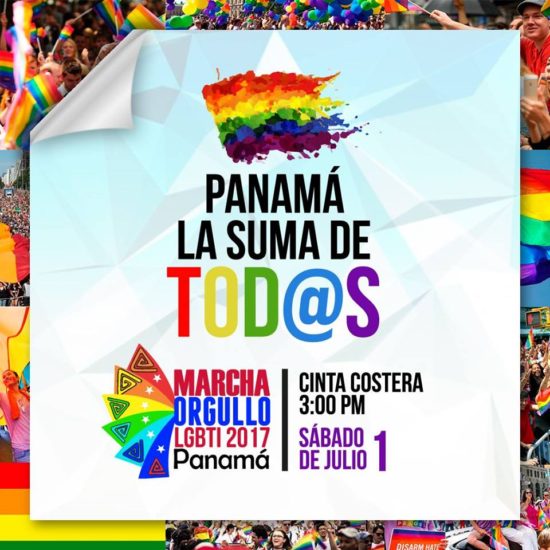On June 2 sex workers and civil liberties activists marched to National Police headquarters, intending to deliver a letter to the chief complaining about abuses against prostitutes. The riot squad moved in and 15 protesters were arrested. After mediation by University of Panama rector Eduardo Flores — some of those detained were students — the 11 women and four men were released without charge. Video by El Kolectivo.
Culture Wars 2017
by Eric Jackson
Should the state be Christian or secular? What should the role of women be in society? Are those with sexual orientations other that heterosexual disgusting perverts who must be suppressed, or citizens whose rights and freedoms should be defended? What, if anything, should the nation’s schools tell kids about such subjects?
These arguments have been going on for a very long time: in society at large, in the learned professions, among and within the religious denominations and increasingly in Panamanian political life. Some were the subjects of civil warfare during the eras when Panama was part of the Spanish Empire, then part of Colombia. Some have been lurking quietly on the margins until relatively recently.
It’s a difficult set of subjects to accurately measure with public opinion polls, but such little polling as has been done suggests that Panama has been very conservative in many ways but is going through some dramatic changes like many other Latin American countries are. An overwhelming majority of Panamanians are nominally Catholic, but the church is slowly evolving on the one hand and losing adherents to those who become less religious or non-religious on the one hand and to other religious denominations — the Evangelicals are the ones who are picking up the most converts — on the other.
What appears to be going on now is a shift and polarization, with secular and libertarian strains informally but effectively merging their movements and efforts. The Catholic Church appears to be mostly withdrawing from these battles and urging tolerance if not full acceptance. A militant religious right centered around Evangelical reverends is preaching intolerance and non-acceptance of homosexuals, women who live or aspire to non-traditional roles, sex education in the schools and the separation of religious and public institutions. In recent days the battles have become pronounced on several fronts.

The bust, and the police as religious enforcers
Prostitution is legal in Panama, and long has been. Among richer boys, it’s quite common that a first sexual experience will be with a prostitute. But although it’s an ancient and legal craft, it’s socially denigrated. Our misogynistic former President Ricardo Martinelli felt no inhibition about calling a critic an “hijo de puta” — son of a whore — and only a few Panamanians took him to task for his frequent use of this abusive expression.
Over many decades, public policy was that prostitution, though legal, was so degrading as to be properly reserved for foreign women. There were special visas for this purpose, many obtained by young Colombian and Dominican women with plans for a university education or to start a business or farm. The world, and particularly the US government, began to look askance at human trafficking for such purposes. The practice didn’t particularly stop, but largely went underground. There are lots of foreign prostitutes working in Panama and on the one hand they are hassled by police and on the other enslaved by pimps and madams who will confiscate their passports to keep them from going anywhere. Over recent years the Spaniards who had dominated the brothel scene have largely been muscled out by Russian mobsters.
Come June 2 and it’s International Sex Workers Day, but the foreign women in that line of work here were generally in no position to take part in any public protests. To do so would likely lead to arrest and deportation. However, Panama’s ever stronger feminist movement and a wide array of human rights activists were willing to take a stand for the rights of sex workers, and by and large they did. The focus this year was on police harassment.
Where does this put the police, who are increasingly recruited from the ranks of Evangelicals and who are indoctrinated about a duty to God? They would see themselves as unfairly criticized for doing their job of upholding laws about public morals. They would see themselves as insulted by the suggestion that some in their ranks take advantage of women in dicey legal situations. Some might see themselves as the flaming sword of The Lord. In any case they did not allow protesters to deliver a complaint about police abuses of sex workers to National Police Director Omar Pinzón.
According to the protesters the cops were not all that fundamentalist about it in a Ten Commandments sense — they say that they were not blocking ingress and egress to the police headquarters, but protesting near the bus stop, when the riot squad pushed them against the gate and then arrested several of their number. The proffered excuse? The protesters were blocking the gate. And this little stricture about not bearing false witness? Its violation is a problem in police forces in many places, and also in the religious right of many nations and faiths. This is not to say that everyone who criticizes the police, or the religious right, has inerrant truth on his or her side.
Same-sex marriage
Many a country thought be unalterably conservative about this issue have made rapid changes. Ireland may be the most salient example, but it’s a phenomenon throughout much of the world. And now the subject has been presented to the Panamanian courts. Two cases, one of a British subject and a Panamanian married in a British diplomatic mission, and the other of two Panamanians married in the US state of Illinois, have been filed in the Panamanian courts. Both gay male couples argue that Article 26 of the Family Code, which defines marriage as between a man and a woman, violates several articles of Panama’s Constitution and also some international human rights treaties to which Panama is a party. The cases have been filed by the prominent law firm of Morgan & Morgan, for which one of the four plaintiffs works.
The Attorney General and the Administrative Prosecutor, Kenia Porcell and Rigoberto González respectively, take opposing sides on the question.
Porcell opposes same-sex marriage, citing Article 15 of the Constitution, which holds that citizens and foreigners have the same rights and arguing that foreign marriages should not be given more rights than those registered in Panama. But of course, the plaintiffs seek a sweeping ruling that would legalize same sex marriages for Panamanians under this country’s laws.
González argues that the ban on same-sex marriages is a species of sex discrimination that’s prohibited by the Constitution. In the scheme of things his rank is the same as Porcell’s and often the courts pay attention to the stands taking by these top officials.
Whether the Supreme Court will take the cases and what they will do remains to be seen. The institution is widely despised by Panamanians so doing something bold and decisive — whichever way — might be a useful distraction. But either way, a lot of people will still dislike the high court.

Gay Pride
When Juan Carlos Varela became president, gay leaders were quite pessimistic. The man was a member of the right-wing Catholic organization Opus Dei and they expected the worst.
But a new pope, a more tolerant and progressive man, came to lead the Catholic Church. Plus Varela, notwithstanding all stalls, cover-ups and opacity, is likely touched by the Odebrecht bribery scandal and widely perceived to be. He appears to be, unlike his predecessor, cultivating a nice guy image rather than playing tough. It fits the president’s tolerant image for him to accept that Panama has a gay community of worthy men and women. It fits the scientifically sophisticated aura the industrial engineer turned politician would exude to understand that there are transgendered persons and to seek honorable and productive places for them in society. And then there’s the first lady, former television reporter Lorena Castillo de Varela. She will be carrying the rainbow flag in the July 1 Pride March.
Pride has come a long way from being ridiculed as a freak show to being honored as a civil rights march. There are people who will be appalled, but the religious right will probably not stage any counter-demonstration because the way that Panamanian public opinion appears to be evolving, they would be the ones to look ridiculous.
Legislation
This last legislative session, as the one before, saw sex education in the schools proposed and fought for. Despite polls showing a large majority of Panamanians in favor of this and despite the Catholic resistance softening, the Evangelicals put up a raucous fight and the proposal failed again.
Now Panama’s first and most noteworthy gay rights organization, the Association of New Men and Women of Panama (AHMNP), is for the third straight year proposing legislation to bar discrimination against lesbians, gay men, bisexuals and the transgendered. The last two times it didn’t even get to a committee vote. Perhaps it will fare better this time, but with some honorable exceptions like the Balboa Union Church and Rabbi Gustavo Kraselnik few religious leaders or organizations seem ready to take a public stand in favor of the proposition that gay people have any rights. Those who will mobilize their congregations to affirm that the LGBT communities have no right are the minority among Panama’s peoples of faith, but the odds are that the legislators will listen to them.
~ ~ ~
These announcements are interactive. Click on them for more information.










